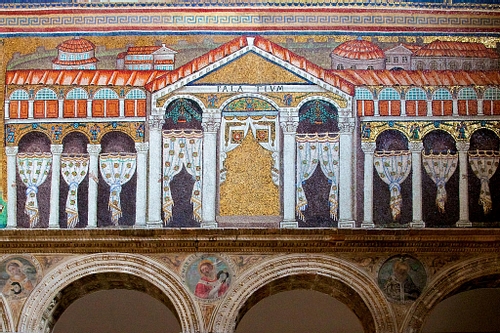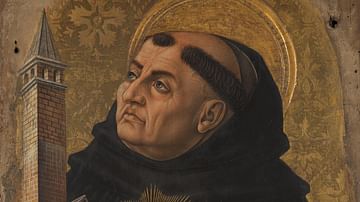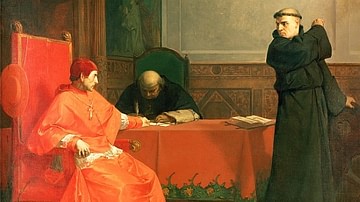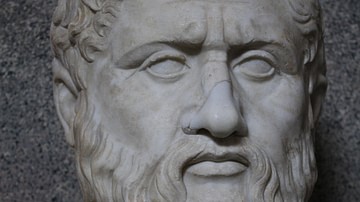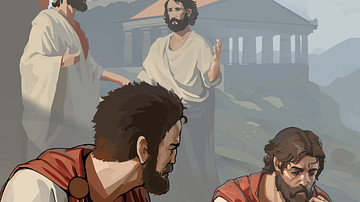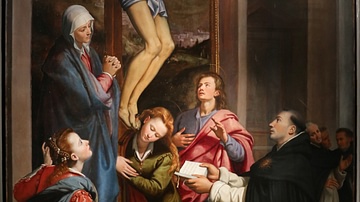Anicius Manlius Severinus Boethius (c. 477-524/525) was a scholar in Late Antiquity who was imprisoned and executed by Theodoric (r. 493-526 CE) but was later idolised by medieval intellectuals. His most famous work was De consolatione philosophiae (Consolation of Philosophy), and he can be held up as the thinker who bridged two ages: the last of the Romans, first of the scholastics.
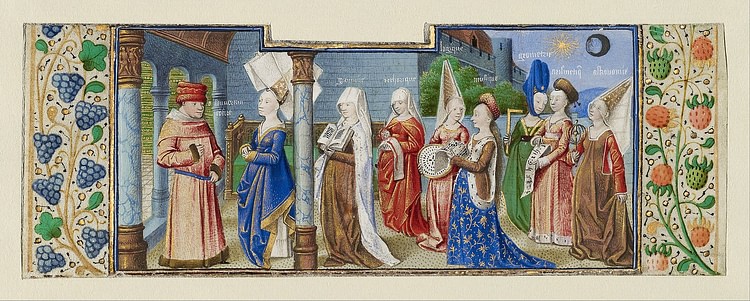
The Last of the Romans
Boethius’ life is set on the stage of the death struggle of the Roman Empire in Italy. Alaric the Goth (r. 394-410 CE) had sacked Rome in 410 CE, and in 476 CE, about the time Boethius was born, King Odoacer (r. 476-493 CE) had deposed the last Western Roman emperor. This was the fall of the Western Roman Empire, but the East survived with a Byzantine emperor in Constantinople, and he played off these 'barbarians' against each other with the aim of keeping a degree of control over them. Emperor Zeno (r. 474-491 CE), for instance, invited Theodoric to overthrow Odoacer when Boethius was about ten years old. Some time and much bloodshed later and Theodoric was the new King of Italy.
Theodoric may never have been invested as a full Roman Emperor or anything more than the most nominal vassal of Constantinople, but he did receive the imperial regalia and accept the place of the Roman aristocracy. Classical society lived on in Rome, as did its administrative structures. This was Boethius’ world. He was one among many aristocrats who modelled themselves on their illustrious ancestors, walked the same streets and held the same senatorial offices, all under the thumb of a barbarian king.
It is little wonder that Boethius saw himself as one of the last lights of learning in a darkening world. He was taught by the noted scholar Quintus Aurelius Memmius Symmachus (d. 526), who fully adopted him after his father died, and when he grew up, Boethius decided to work on the translation of the most important Greek philosophical texts into Latin. He threw himself into translations of Aristotle (384-322 BCE) and Plato (428/427 - 348/347 BCE) in the hope that their ideas would survive even as the educated Roman milieu who could read their Greek was disappearing. That world was not yet dead but it is interesting that the famous School of Athens closed for good a mere four years after Boethius’ death. He was the last of the Romans indeed.
Such people may have seemed like a strange throwback, out of their time. Noblemen were now mainly military types. Gothic kings like Theodoric dressed as Late Roman generals, not in the togas that had been the symbol of power since the era of Augustus (r. 27 BCE - 14 CE). Alternatively, they joined the Church, and education was increasingly the province of monks and bishops. The ideal of the Roman aristocrat who lived in a villa and could quote Virgil (70-19 BCE) and other Roman literature was less and less relevant. Perhaps the best claim Boethius has to being the last of the Romans is that he still strove for that ideal. He was a scholar-aristocrat, a man who displayed his privilege and prestige in his knowledge of Aristotle and the rules of rhetoric and engagement in civic life. He did not fit the new mould of the learned cleric or of the martial strongman. This is not to say he was not a Christian - indeed he wrote extensively on theology - only that his Christianity was embedded in the old Roman world where the aristocracy received a complex classical education.
His sophistication evidently impressed the king and he rose in rank and reputation. In 522, Theodoric appointed Boethius as the Master of Offices in his capital, Ravenna, while both of Boethius’ sons flourished as consuls in Rome. Officially, Boethius’ role was to reform the coinage, but Theodoric loved to show off the talents of his subjects. Boethius was tasked with producing technological marvels like sundials and water clocks so that all would know the grandeur and sophistication of Theodoric’s court.
However, his prominence only made him vulnerable, and his life’s work was fated to remain incomplete. His career came to an abrupt end in 524 when he stood up to defend another Roman aristocrat, Albinus, who was accused of a treasonous correspondence with Emperor Justin I (r. 518-527 CE), one of Zeno’s successors. Theodoric seemed to think there was some conspiracy by these aristocrats, and he may have been right to suspect that they were more loyal to the idea of a restored Rome than himself. Even the very writing of abstract philosophy like Boethius’ could be seen as an assertion of the strength and independence of the Roman aristocracy over whom Theodoric was trying to rule. So, Boethius was imprisoned, during which time he wrote one of the most influential texts in the entire European philosophical tradition, the Consolation of Philosophy, before he was tortured and bludgeoned to death. Incidentally, Theodoric was an Arian Christian, a sort of early heretic, so the medievals could easily frame Boethius as a martyr.
The First of the Scholastics
It probably would have surprised Boethius to learn that his work was a crucial part of a cultural renaissance about 600 years after his death. Western Europe in the 12th century was experiencing a new phase of growth and development that laid the foundations for what we now call the High Middle Ages. This was the time that is the most iconically medieval, the time of the Crusades, medieval heraldry, the romances of medieval chivalry, and Gothic architecture. Perhaps a less dazzling product, but no less an important one, were the scholastic philosophers, the cutting-edge and high-powered intellectuals of the day. These men - and, occasionally, women - tried to use reason to understand their Christian faith and the fundamental workings of the world, often inspired by the classical philosophers who went before them.
Reading about Boethius’ influence is like reading a who’s who of the scholastics. We must begin with the inimitable Thomas Aquinas (1225-1274), whose very technical work is indebted to Boethius on a number of levels, including the definition of eternity, key to all medieval explanations of metaphysics. Aquinas credited Boethius as having reconciled the ancient Greek philosophy of Plato and his idea of the eternity of the world with the creation story of Christianity. He was probably referencing Bernard of Silvestris’ (probably 1085-1178) interpretation of Boethius a hundred years or so earlier. Bernard of Silvestris is less of a name to conjure with these days, but he was among the famous thinkers of his day.
Finding a middle ground between Plato’s eternal world and the Book of Genesis was incredibly important to a worldview that loved classical learning and was also committed to the Bible and medieval church doctrine. In fact, Boethius’ translations were some of the only writings of Plato available to the scholastics. Plato was definitely the most important Greek philosopher for the early scholastics until Aquinas more or less single-handedly replaced him with Aristotle. Even then, though, the medievals knew Aristotle’s logic via Boethius. He had commented on Porphyry’s (c. 234-305 CE) commentary on Aristotle, and it was Porphyry who set out the problem of universals that would dog scholastic philosophers from then on.
Hildegard of Bingen (1098-1179), perhaps the most famous of the scholastic women, and even the writer Geoffrey Chaucer (c. 1343-1400) were much inspired by Boethius. Finally, we must mention that Boethius’ most famous work - the Consolation of Philosophy - was translated by Alfred the Great (r. 871-899) himself. Alfred’s work was before the scholastics, during another Western Christian renaissance in the 800s. The king added some specifically Anglo-Saxon references to make it understandable to his readers, what modern translators would call "localisation". So, Boethius was up on a pedestal with the greatest of the Church Fathers.
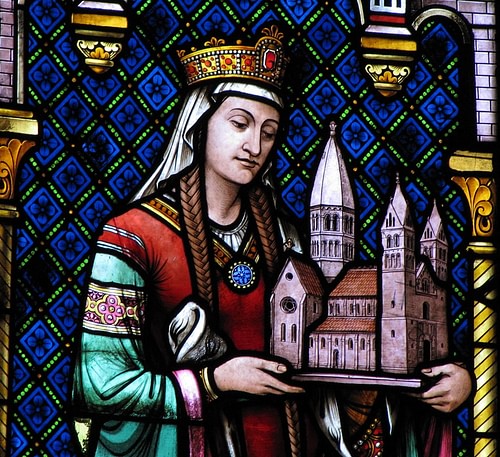
Boethius became so popular that the Consolation of Philosophy was more or less a textbook to the students thronging to the new and flourishing universities, like Oxford, Bologna, and especially, Paris. In the 1220s, a new text attributed to Boethius suddenly appeared in Paris: De Disciplina Scholarium. The Latin title may make it sound elevated to us, but it is a self-help manual for new university students, in which the 'Boethius' takes the time to advise you on practical matters like budgeting for food and how to manipulate your parents for money. Modern scholars think nothing is more certain than this text was not written by Boethius, of course, but it was taken very seriously at the time. Very likely, his name was invoked to connect the still new universities to the older centres of learning associated with Boethius, and thus legitimise them, just as medieval Europe as a whole legitimised itself as next in line from the Roman world.
The Consolation of Philosophy
Boethius’ philosophy and approach to life were much more reflective of his late antique context than medieval, and he certainly should not be unproblematically lumped in with the scholastics. For one thing, the text is easy to read, quite a contrast to the hyper-accurate, technical scholastic style. It takes the form of a dialogue between Boethius himself, lamenting his fate in his cell as he awaits execution, and Philosophy, who appears to him in the form of a proud woman. In a mixture of prose and verse, she consoles him. At first, this means giving him what she calls "gentle medicines" (Boethius, 58), all the ways in which he has been fortunate and remains fortunate, despite his current predicament. Then she gradually builds to the real point that there is no point at all in lamenting fortune, which is constant and changing, and the educated man ought to fix his mind on higher things.
It is certainly written with classical concerns in mind. Boethius’ enemies are the Epicureans and the Stoics, who Philosophy tells him have torn pieces of her dress, put them on, with "the slight trace of my clothing on them gained them the reputation among the ignorant of being my familiars" (42). His concern is with these classical schools of thought, with their origins in ancient Greece, rather than Christian heretics, in contrast to someone like Augustine of Hippo (354-430 CE) who railed against the Donatists. He also mentions the duty of philosophers to take part in public administration, a Roman tradition mentioned above, that he says was authorised by Plato to prevent "wicked and unprincipled men" (44) monopolising power. Boethius also takes the time to lament the decline of the office of praetor in his own time. Besides all that, it is littered with classical references. The appearance of the grey-eyed lady Philosophy would be instantly recognisable to his Roman readers as Minerva. She mentions stories from Livy and Herodotus and invokes Circe and the Cyclops from Homer's Odyssey, Cicero the premier Roman orator, and - of course - Hercules from Greek mythology.
Another classical figure to feature is Pythagoras (c. 571 - c. 497 BCE). It is his command - not Jesus Christ's - to "follow God" that Boethius has Philosophy tell him to obey (48). Pythagoras was considered to be a prophet by the Neoplatonists, and the influence of the Neoplatonists is evident throughout. Although little known today, Neoplatonism was a very popular philosophy from the 3rd century CE, competing with other rising religions like the Cult of Mithras, Manichaeism, and Christianity. Plotinus (204/205-270 CE), the founder, reinterpreted Plato as a kind of prophet, a purveyor of a higher, divine truth about the universe. According to this view, true happiness is the ultimate communion with God that one achieves by rising above one's troubles and becoming perfect.
The eventual consolation is that there is nothing to be consoled about, as all the things he once had were nothing more than transient pleasures. Ascendence to a better, purer knowledge of how things really are is what Philosophy means when she says "I shall give your mind wings upon which to lift itself" (122). Boethius' identification of goodness with divinity lets Philosophy tell us that the truly good become gods (129). This may have been perfectly acceptable in a Platonic conception of the world, but not in medieval Christianity. As well as clearly not being a scholastic, it is worth asking whether Boethius was even Christian. The short answer is yes. Aside from Christian influences already mentioned, and his theology in other works, a medieval Christian might find consolation in that Boethius does make time for prayer. His whole concern with eternity is based on a fear that God’s knowledge of everything that will ever happen means there is no room for a relationship with God and His help in response to prayer, just a series of predetermined actions. He and Philosophy work through the problem in the fifth book, which is incidentally the hardest to read. This one is the most famous among philosophers for this reason.
Essentially, Boethius’ argument - which he puts in Philosophy’s mouth - is that if you see something happen, it does not make it necessary. Consequently, just because God has foreseen everything that will happen, there is nothing about each individual act itself that is certain. He uses the example of being in the audience of a chariot race. It is the decisions of the driver that determines the race, you just watch it happen. People still get free will even though God knows what they will do. Therefore they can have a special relationship with God, God can help them along to make the right choices, and give them strength when they need it. The discussion ends with the following:
Hope is not placed in God and prayers are not made in vain, for if they are of the right kind they cannot but be efficacious. Avoid vice, therefore, and cultivate virtue; lift your mind up to the right kind of hope and put forth humble prayers on high. A great necessity is laid upon you, if you will be honest with yourself, a great necessity to do good, since you live in the sight of a judge who sees all things. (175)
You can argue that this applies as much to the Neoplatonist God as the Christian one. True, but in Boethius' context, there may not have seemed to be so much difference between the two. Even very zealous Christians like Augustine had to polish their language with knowledge of Virgil and Homer because classical preoccupations did not fall out of usage with the rise of Christianity. The liberation of the mind is a different twist on the Christian message to the salvation of the eternal soul, but the mood is similar, and it is not hard to see how the two might be seen as mutually beneficial, even conflated. We might say the same about the scholastics. At their best, they were pursuing their own form of intellectual happiness within their own Christian framework, and they too were reaching for truth through reason as well as faith. Philosophy stridently declares: "Once earth has been surpassed, it gives the stars" (152). Aquinas would have surely approved of that.
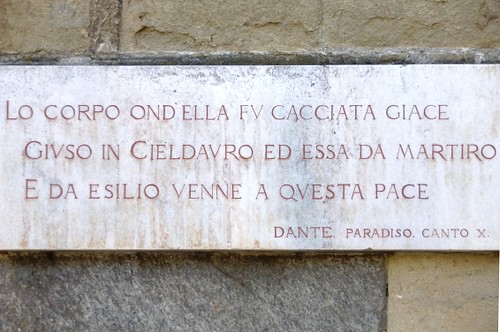
We cannot say that Boethius was the first scholastic in methods or outlook. That might be Anselm of Canterbury (1033/4-1109) or similar, but Boethius was used as such. He himself never saw himself as a scholastic, but those writers saw him as their link between their world and the world of the Romans, ancestors they admired so much. It is not true that he was their direct intellectual forebear. Nonetheless, it is hard to imagine scholasticism without Boethius.
